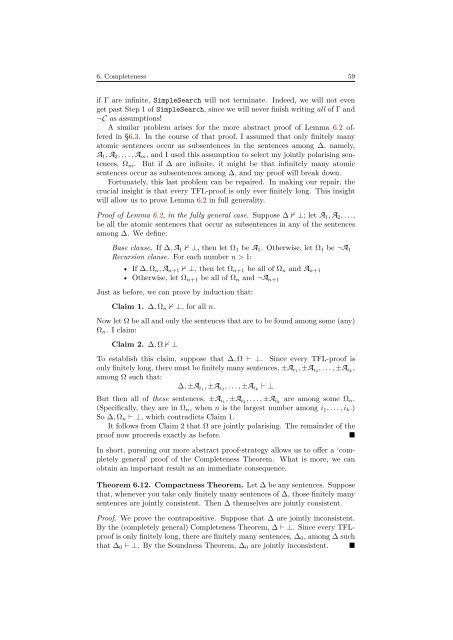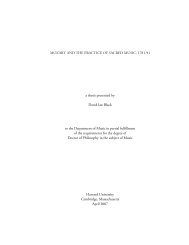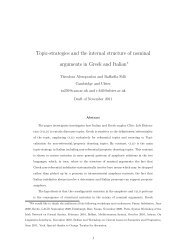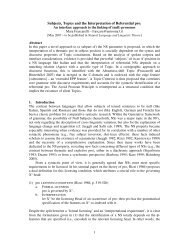Metatheory - University of Cambridge
Metatheory - University of Cambridge
Metatheory - University of Cambridge
You also want an ePaper? Increase the reach of your titles
YUMPU automatically turns print PDFs into web optimized ePapers that Google loves.
6. Completeness 59<br />
if Γ are infinite, SimpleSearch will not terminate. Indeed, we will not even<br />
get past Step 1 <strong>of</strong> SimpleSearch, since we will never finish writing all <strong>of</strong> Γ and<br />
¬C as assumptions!<br />
A similar problem arises for the more abstract pro<strong>of</strong> <strong>of</strong> Lemma 6.2 <strong>of</strong>fered<br />
in §6.3. In the course <strong>of</strong> that pro<strong>of</strong>, I assumed that only finitely many<br />
atomic sentences occur as subsentences in the sentences among ∆, namely,<br />
A 1 , A 2 , . . . , A m , and I used this assumption to select my jointly polarising sentences,<br />
Ω m . But if ∆ are infinite, it might be that infinitely many atomic<br />
sentences occur as subsentences among ∆, and my pro<strong>of</strong> will break down.<br />
Fortunately, this last problem can be repaired. In making our repair, the<br />
crucial insight is that every TFL-pro<strong>of</strong> is only ever finitely long. This insight<br />
will allow us to prove Lemma 6.2 in full generality.<br />
Pro<strong>of</strong> <strong>of</strong> Lemma 6.2, in the fully general case. Suppose ∆ ⊬ ⊥; let A 1 , A 2 , . . .,<br />
be all the atomic sentences that occur as subsentences in any <strong>of</strong> the sentences<br />
among ∆. We define:<br />
Base clause. If ∆, A 1 ⊬ ⊥, then let Ω 1 be A 1 . Otherwise, let Ω 1 be ¬A 1<br />
Recursion clause. For each number n > 1:<br />
• If ∆, Ω n , A n+1 ⊬ ⊥, then let Ω n+1 be all <strong>of</strong> Ω n and A n+1<br />
• Otherwise, let Ω n+1 be all <strong>of</strong> Ω n and ¬A n+1<br />
Just as before, we can prove by induction that:<br />
Claim 1. ∆, Ω n ⊬ ⊥, for all n.<br />
Now let Ω be all and only the sentences that are to be found among some (any)<br />
Ω n . I claim:<br />
Claim 2. ∆, Ω ⊬ ⊥<br />
To establish this claim, suppose that ∆, Ω ⊢ ⊥. Since every TFL-pro<strong>of</strong> is<br />
only finitely long, there must be finitely many sentences, ±A i1 , ±A i2 , . . . , ±A ik ,<br />
among Ω such that:<br />
∆, ±A i1 , ±A i2 , . . . , ±A ik ⊢ ⊥<br />
But then all <strong>of</strong> these sentences, ±A i1 , ±A i2 , . . . , ±A ik are among some Ω n .<br />
(Specifically, they are in Ω n , when n is the largest number among i 1 , . . . , i k .)<br />
So ∆, Ω n ⊢ ⊥, which contradicts Claim 1.<br />
It follows from Claim 2 that Ω are jointly polarising. The remainder <strong>of</strong> the<br />
pro<strong>of</strong> now proceeds exactly as before.<br />
■<br />
In short, pursuing our more abstract pro<strong>of</strong>-strategy allows us to <strong>of</strong>fer a ‘completely<br />
general’ pro<strong>of</strong> <strong>of</strong> the Completeness Theorem. What is more, we can<br />
obtain an important result as an immediate consequence.<br />
Theorem 6.12. Compactness Theorem. Let ∆ be any sentences. Suppose<br />
that, whenever you take only finitely many sentences <strong>of</strong> ∆, those finitely many<br />
sentences are jointly consistent. Then ∆ themselves are jointly consistent.<br />
Pro<strong>of</strong>. We prove the contrapositive. Suppose that ∆ are jointly inconsistent.<br />
By the (completely general) Completeness Theorem, ∆ ⊢ ⊥. Since every TFLpro<strong>of</strong><br />
is only finitely long, there are finitely many sentences, ∆ 0 , among ∆ such<br />
that ∆ 0 ⊢ ⊥. By the Soundness Theorem, ∆ 0 are jointly inconsistent. ■
















